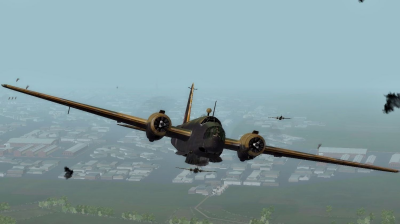Difference between revisions of "Vickers Wellington Mk III"
| (One intermediate revision by the same user not shown) | |||
| Line 17: | Line 17: | ||
|} | |} | ||
=History= | |||
The long-awaited Wellington heavy bomber brings the Allied Air Forces on par with the Axis He-111 heavy bomber. Each will have comparable and flexible bomb load-outs which is a new feature for WWII Online. Not only will the Wellington carry a significant bomb load onto the target area, but it also has significant forward and rear-facing armament to keep those pesky enemy fighters away from the fabric-covered bomber. A great secret to the Wellington is the unique and robust quality of its construction due to the geodetic design developed by the aircraft designer, Barnes Wallis. | The long-awaited Wellington heavy bomber brings the Allied Air Forces on par with the Axis He-111 heavy bomber. Each will have comparable and flexible bomb load-outs which is a new feature for WWII Online. Not only will the Wellington carry a significant bomb load onto the target area, but it also has significant forward and rear-facing armament to keep those pesky enemy fighters away from the fabric-covered bomber. A great secret to the Wellington is the unique and robust quality of its construction due to the geodetic design developed by the aircraft designer, Barnes Wallis. | ||
The Vickers Wellington was a British twin-engined, long-range medium bomber. It was designed during the mid-1930s. A key feature of the aircraft is its geodetic airframe fuselage structure, this specification called for a twin-engined day bomber capable of delivering higher performance than any previous design. | |||
The Wellington was used as a night bomber in the early years of the Second World War, performing as one of the principal bombers used by Bomber Command. During 1943, it started to be superseded as a bomber by the larger four-engined "heavies" such as the Avro Lancaster. The Wellington continued to serve throughout the war in other duties, particularly as an anti-submarine aircraft. | |||
=Ingame= | |||
Here below is Hyoslvr's YouTube vidoe on it cockpit and layout: | |||
{| | |||
!colspan="2" | | |||
|- | |||
!text align="center"| | |||
| <youtube width="700" height="450">l_tMdMwhb9I</youtube> | |||
|} | |||
[[Category:Air_Units]] | [[Category:Air_Units]] | ||
Latest revision as of 06:35, 5 November 2023
History
The long-awaited Wellington heavy bomber brings the Allied Air Forces on par with the Axis He-111 heavy bomber. Each will have comparable and flexible bomb load-outs which is a new feature for WWII Online. Not only will the Wellington carry a significant bomb load onto the target area, but it also has significant forward and rear-facing armament to keep those pesky enemy fighters away from the fabric-covered bomber. A great secret to the Wellington is the unique and robust quality of its construction due to the geodetic design developed by the aircraft designer, Barnes Wallis.
The Vickers Wellington was a British twin-engined, long-range medium bomber. It was designed during the mid-1930s. A key feature of the aircraft is its geodetic airframe fuselage structure, this specification called for a twin-engined day bomber capable of delivering higher performance than any previous design. The Wellington was used as a night bomber in the early years of the Second World War, performing as one of the principal bombers used by Bomber Command. During 1943, it started to be superseded as a bomber by the larger four-engined "heavies" such as the Avro Lancaster. The Wellington continued to serve throughout the war in other duties, particularly as an anti-submarine aircraft.
Ingame
Here below is Hyoslvr's YouTube vidoe on it cockpit and layout:
